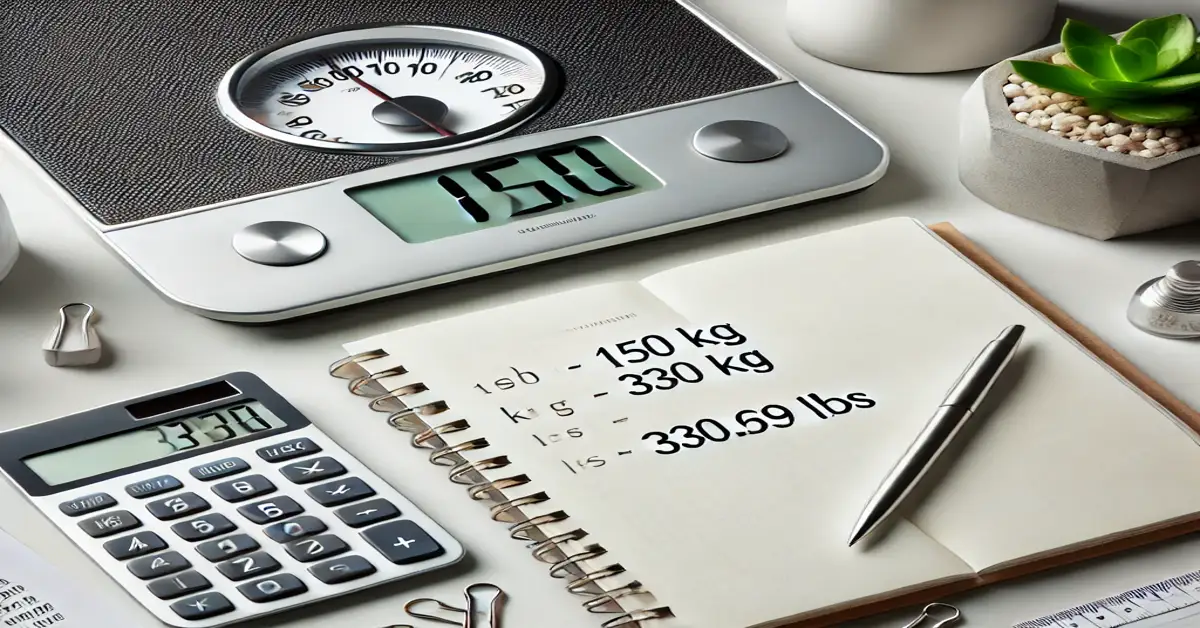When it comes to measurements, understanding the conversion between kilograms and pounds is crucial. If you’ve ever found yourself staring at a weight reading in kilograms, wondering how it translates into pounds, you’re not alone. The metric system can sometimes feel like a puzzle waiting to be solved. Whether you’re tracking your fitness goals, cooking recipes from around the world, or shipping packages internationally, knowing how to convert 150 kg to lbs can make all the difference.
This guide will unlock the mysteries of 150 kg to lbs conversion for you. You’ll learn about calculators designed for accuracy as well as the formulas that power these conversions. Plus, we’ll explore why grasping this measurement is significant in everyday life. So let’s dive right into the numbers and empower you with knowledge!
Conversion Explained: 150 kg to lbs
When you encounter a weight of 150 kg, converting it to pounds can seem daunting at first. However, the process is straightforward once you understand the basics. The kilogram and pound are both common units of mass used around the world, but they belong to different measurement systems.
To convert kilograms to pounds, there’s a specific factor that comes into play: one kilogram equals approximately 2.20462 pounds. This means that for every kilogram you have, you multiply by this conversion factor to get the equivalent weight in pounds.
So when we take 150 kg and apply our conversion factor, we find ourselves multiplying: 150 x 2.20462 gives us an impressive total of about 330.693 pounds. It’s fascinating how such numbers come together seamlessly with just a simple calculation!
This knowledge isn’t just useful for academics or scientific endeavors; it’s practical for anyone dealing with weights in their daily life—especially if you’re involved in fitness or cooking internationally.
Understanding how to convert between these two units opens up new possibilities and enhances your ability to communicate effectively across cultures that use different measurement systems. Whether you’re lifting weights at the gym or preparing meals from diverse cuisines, knowing what 150 kg translates to in lbs can make all your activities smoother and more informed.
Calculator for Accurate Conversions
When it comes to converting 150 kg to lbs, accuracy is key. That’s where a conversion calculator shines. These handy tools take the guesswork out of manual calculations. With just a few clicks or taps, you can get precise results in seconds.
Many online calculators are user-friendly and accessible on various devices. Simply input the value in kilograms, and instantly see the equivalent weight in pounds. This saves time and eliminates any potential errors that might occur when calculating by hand.
Mobile apps also offer convenient options for conversions on-the-go. Whether you’re at the gym or grocery shopping, these apps ensure you always have accurate data at your fingertips. They often come with additional features like unit converters for other measurements as well.
For those who prefer offline solutions, using a scientific calculator can be effective too. Just remember to know the conversion factor beforehand—1 kilogram equals approximately 2.20462 pounds—and apply it accordingly for quick mental math whenever needed.
Having access to an accurate 150 kg to lbs converter makes life easier for anyone dealing with weights regularly—from fitness enthusiasts tracking their progress to chefs measuring ingredients precisely in recipes requiring specific units.
READ MORE:Convert 29 Celsius to Fahrenheit: Temperature Conversion
Conversion Factor and Formula for Kilograms to Pounds
To convert kilograms to pounds, you need a simple conversion factor. The standard multiplier is 2.20462. This means that for every kilogram, there are approximately 2.20462 pounds.
Using this formula can make the conversion straightforward. If you have a specific weight in kilograms, simply multiply it by 2.20462 to find out how many pounds that weight equals. For example, if you’re converting 150 kg to lbs, just do the math: \(150 \times 2.20462\).
The result of this calculation gives you around 330.693 pounds—a figure that’s often useful in various fields such as fitness, shipping, and cooking.
This formula is not only effective but also easy to remember with a little practice. It simplifies what could be an overwhelming task into something manageable.
It’s beneficial for anyone who frequently works with different measurement systems or needs quick conversions on the go! Understanding this relationship improves your ability to communicate effectively across borders where measurements differ significantly.
The Significance of Knowing the Conversion
Understanding the conversion from kilograms to pounds holds significant importance in various fields. For starters, weight measurements often vary depending on geographical location. Many countries use the metric system, while others stick to imperial units. Knowing how to convert between these two can prevent misunderstandings and errors.
In industries such as shipping and logistics, accurate weight conversions are crucial. Shipping costs are frequently determined by weight; hence, knowing 150kg to lbs ensures that businesses operate efficiently and avoid unexpected expenses. A small miscalculation could lead to budget overruns or delays in transport.
Health and fitness enthusiasts also benefit from understanding this conversion. Gym equipment, dietary recommendations, and body weights may be listed in different units across resources. Being able to interpret these measurements accurately helps individuals set realistic goals for their workouts or nutrition plans.
Additionally, cooking recipes often require precise ingredient measurements. Some recipes may list weights in kilograms while others might use pounds. Converting accurately ensures that your culinary creations turn out just right without any guesswork involved.
Education plays a vital role too. Students learning about measurement systems encounter both kilograms and pounds regularly. Mastering conversions enhances their math skills while helping them grasp real-world applications of what they learn in school.
READ MORE:Social Media and Education: Middle Schoolers TikTok Teachers
Queries about Kilograms to Pounds Conversion
When converting kilograms to pounds, people often have common questions. One frequent query is about the accuracy of conversion rates. The standard conversion factor is 2.20462 pounds per kilogram. This means that for every kilogram, you can multiply by this number to find the equivalent weight in pounds.
Another popular question revolves around why someone would need this conversion at all. Individuals working with international measurements often require conversions due to varying units used across countries. Whether it’s for fitness goals or shipping weights, understanding these metrics becomes essential.
People also ask how to make quick conversions without a calculator. A handy rule of thumb is to remember that one kilogram is approximately equal to two and a quarter pounds. While it’s not perfectly precise, it allows for easier mental math in everyday situations.
Some may wonder if there are any specific industries where kg-to-lbs conversions are vital. Absolutely! The fitness industry frequently uses both forms of measurement when tracking progress or setting targets for clients from different regions.
Many want to know if the formula changes over time or varies by country. Thankfully, the metric system remains consistent globally; thus, the same formula applies everywhere you go—making your calculations reliable and straightforward no matter where you are.
Conclusion
Understanding the conversion from 150 kg to lbs is essential for many reasons. Whether you’re traveling, cooking, or engaging in fitness activities, knowing how different weight measurements translate can simplify your tasks. The formula and conversion factor make it easy to calculate weights accurately.
Using a calculator enhances precision and saves time. It’s particularly beneficial when dealing with multiple conversions or larger numbers. Knowing that 1 kilogram equals approximately 2.20462 pounds helps streamline this process.
Being familiar with these conversions fosters better communication across various contexts where both metric and imperial systems coexist. It also aids international trade and travel as you navigate through different measurement units seamlessly.
If you have any lingering questions about converting kilograms to pounds, don’t hesitate to seek further clarification on specific scenarios or needs! Understanding these concepts will undoubtedly enhance your proficiency in navigating global standards of measurement while ensuring accuracy in everyday situations related to weight.
So whether it’s lifting weights at the gym or purchasing ingredients for a recipe, mastering the understanding of 150 kg to lbs empowers you with knowledge that serves practical purposes every day.
READ MORE:Convert 27 C to F: Comprehensive Guide and Applications









